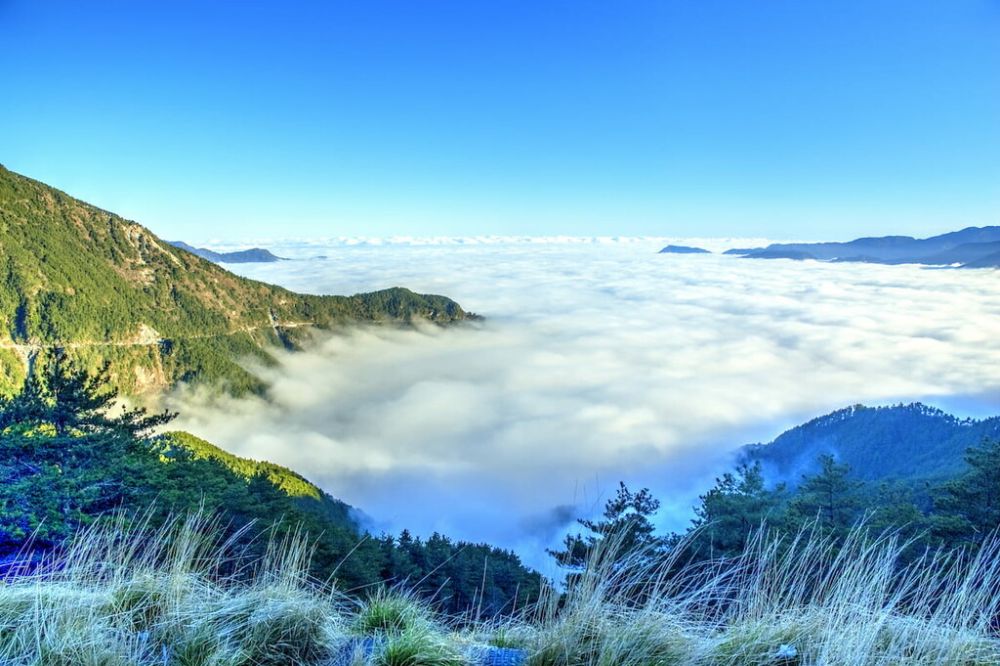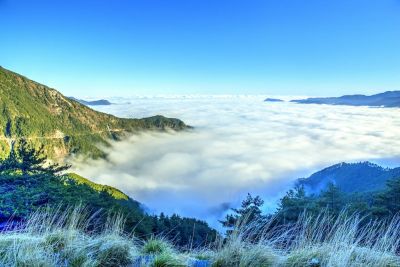

Trekking to the summit of Yushan, Taiwan's highest mountain, is a breathtaking journey for avid mountaineers. The adventure typically starts from the trailhead at Tatajia Saddle, where hikers embark on a two-day climb comprising approximately 8.5 kilometers to the peak at 3,952 meters above sea level. Along the way, trekkers pass the iconic Paiyun Lodge, a resting point where climbers can refresh and spend a night to acclimatize. The trail is well-maintained with signposts and provides various challenges including steep ascents, rocky terrains, and staircases hewn into the mountain face. The climb culminates in a rewarding sunrise view from the top, offering a spectacular panorama of the surrounding peaks and valleys. Climbers must be prepared for the altitude and changes in weather, ensuring they have suitable gear. Permits are mandatory for this peak ascent, as Yushan National Park aims to preserve the natural environment and maintain safety.
The Walami Trail offers hikers an opportunity to explore the lush subtropical rainforests of Yushan National Park. This historic trail, once part of a network of paths used by indigenous people and later the Japanese during their occupation of Taiwan, is now a scenic hike. Over 14 kilometers long, the path takes you across suspension bridges, past cascading waterfalls, and through diverse ecological zones. Hikers can enjoy the vibrant flora and fauna including various bird species, butterflies, and possibly even spot Formosan macaques or Reeves's muntjac. Suspension bridge crossings provide an exhilarating perspective of the deep valleys below. Lodges along the trail offer spots for a comfortable overnight stay. This is a moderate hike suitable for most fitness levels, and you will need to arrange permits in advance to access the trail.
Qilai Mountain Range, within close proximity to Yushan National Park, offers a challenging trek for seasoned hikers. With elevations ranging from 2,000 to 3,600 meters, the Qilai Range features several peaks, but the North and Main Peaks are the most frequented. The trek typically spans multiple days and commences from the Qilai Trailhead at Nanhuaikeng. The path is steep, often requiring climbers to traverse over rocky ridges and navigate through dense forests before arriving at the arresting Qilai Cabin. Here, many hikers spend a night before summiting early the next morning. Views from the peak include the majestic Taroko Gorge. This area is known for unpredictable weather changes and hikers must come prepared with the proper gear; the high altitude experience makes acclimatization a necessity.
Tataka, located in the central part of Yushan National Park, is a prime destination for bird watching enthusiasts. The area's high elevation and dense forests create an ideal habitat for a variety of bird species. Birders can witness the unique and diverse avian life of Taiwan, including the Mikado pheasant and the Taiwan blue magpie. Spring and autumn migrations bring additional species to the area, enhancing the experience. Along well-maintained trails such as the Tataka Nature Trail and the Blue Sky Trail, one can spend hours or even a full day spotting and identifying birds, all while enjoying the serene mountain scenery. It is recommended to bring binoculars and a bird guidebook to fully appreciate the experience, and visitors should be mindful of the park's regulations to avoid disturbing wildlife.
Yushan National Park offers some of the clearest night skies in Taiwan, making it an exceptional location for stargazing. The high altitude and remote location reduce light pollution and allow for unobstructed views of the Milky Way, shooting stars, and astronomical events. The park organizes guided stargazing tours led by knowledgeable guides who provide insights into the cosmos and assist with telescope use. Tours might include a presentation at the visitor center before heading out to designated viewing areas. Due to the popularity of stargazing in the region, it's recommended to book these tours in advance. Participants should dress warmly since temperatures can drop significantly at night, even in summer. The extraordinary celestial display above makes this an unforgettable nighttime activity for all ages.
Located on the western edge of Yushan National Park, Dongpu Hot Springs is a renowned destination for relaxation and rejuvenation. Here, visitors can immerse themselves in natural thermal waters believed to have healing properties due to their mineral content. There are various public and private baths with differing temperatures and scenic views of the surrounding mountains. Bathing in these hot springs is a soothing way to unwind after a day of hiking or exploring the park. The springs are a result of geothermal activity in the region, and the presence of sulfur in the water is said to benefit skin and joint health. Several resorts and facilities around Dongpu offer hot spring baths, with options ranging from budget-friendly public pools to more exclusive private experiences in luxurious settings. This is a year-round activity, with the warmth of the waters providing comfort even during the cooler seasons.
Photography enthusiasts will delight in the picturesque Alishan Range, bordering Yushan National Park. With its vast landscapes, ancient forests, and photogenic sunrise views, Alishan is a photographer's dream. Organized photography tours offer both amateurs and professionals the chance to capture the best shots, with guides knowledgeable about lighting and locations. Tours may include early morning excursions to catch the sunrise from famous vantage points, such as Zhu Shan, or afternoon sessions to photograph the enchanting sea of clouds that often blankets the valleys. The diversity of Alishan's natural scenery, including tea plantations and the iconic Alishan Forest Railway, ensure a rich collection of photo opportunities. A well-planned tour helps photographers make the most of the golden hours and gain insights into the region's culture and ecology.
A trip to Yushan National Park can be complemented with a nostalgic ride on the Alishan Forest Railway, a narrow gauge train originally built for logging but now a popular tourist attraction. The railway is celebrated for its scenic routes winding through the mountains and forests of the Alishan Range. Travelers can board the train at several stations including Chiayi and ascend to the forest recreation area. The journey showcases diverse landscapes, from bamboo groves to towering cypress trees. Alishan Station, at over 2,000 meters above sea level, serves as the gateway to spectacular views and nature trails. Alongside its heritage significance, the train offers visitors a unique perspective on Taiwan's natural beauty and history. Train tickets are available at stations, with various ticket prices depending on the distance and seating class.
The Shanlinxi Forest Recreation Area, within the vicinity of Yushan National Park, is an excellent destination for nature walks and eco-tourism. The area boasts well-paved paths that lead visitors through verdant forests rich in biodiversity. On these tranquil walks, visitors encounter towering red cypress trees, serene ponds, and vibrant rhododendron blooms during spring. Informational signs provide insights into the ecology of the region, and dedicated paths cater to various fitness levels. The Heaven's Altar and the Green Dragon Waterfall are among the notable highlights visitors may encounter on their walks. This activity allows visitors to immerse themselves in Taiwan's lush greenery at their own pace and is suitable for families, photographers, and anyone seeking a peaceful retreat amidst nature.
Yushan National Park is not only about its natural wonders but is also a place where visitors can engage with the rich culture of Taiwan's indigenous peoples. The park offers cultural experiences where participants can learn about the traditions, crafts, and lifestyles of tribes like the Bunun and Tsou. Activities may include craft workshops where visitors can make traditional items under the guidance of local artisans, cultural performances showcasing music and dance, and tasting sessions of indigenous cuisine. These interactions often take place in tribal villages or cultural centers within the park, providing an authentic setting for an enriching experience. By engaging with the indigenous communities, visitors gain a profound appreciation for the human history interwoven with Taiwan's natural landscapes. These programs may require reservations and sometimes involve a fee, which supports the local communities.
